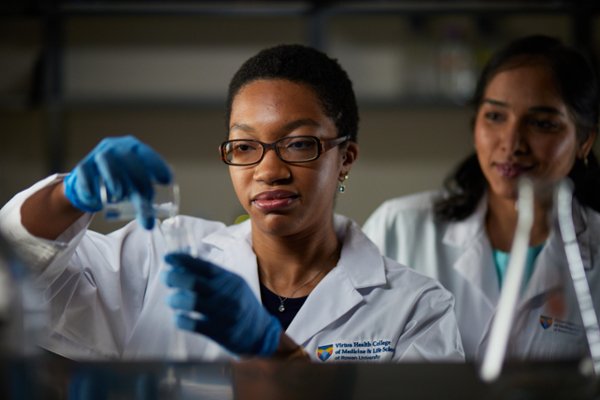Research experience offers an edge for residency applications
Research experience offers an edge for residency applications

A top-tier medical education is built in classroom and clinical settings—and at Rowan-Virtua School of Osteopathic Medicine (SOM), in the research lab.
From cancer to traumatic brain injury to addiction, the school’s extensive network of partnerships and four-year focus on medical scholarship offer opportunities for students to explore research in varied arenas.
“Rowan-Virtua SOM has a lot of great research tools and tons of support for students,” said Minjal Patel, a second-year D.O. student.
Research exposure woven throughout the curriculum
The curriculum at Rowan-Virtua SOM infuses a research component into all four years of medical education—and that’s unique, according to Carl Hock, Ph.D., senior associate dean for research and a professor of cell biology and neuroscience.
Through this curriculum component, “you start thinking about research in medicine from day one,” said Eleni Papadopoulos, a D.O./Ph.D. student. Graduates of this dual program at Virtua Health College will become physician-scientists with the skills to not only practice medicine, but to contribute to the study of diseases, new medical treatments, clinical trials and become educators to the next generation of physicians.
Propelling research journeys
D.O. candidates benefit from partnerships and connections within and outside Rowan.
Numerous faculty members work on grant-funded projects in which they could use an extra set of hands and an eager student mind. During summer 2023, 47 students contributed to basic science and clinical research projects with faculty mentors as part of the Summer Medical Research Fellowship program.
Opportunities for students to get involved in research are always expanding with new programs, such as the Driving Osteopathic Excellence in Research and Scholarship joint initiative with the Veterans Affairs system in Wilmington, Delaware.
Through community-based research programs, like the Area Health Education Center program, students make a difference in the community while contributing to research into serious public health issues.
No prior research experience required
Some students enter the D.O. program with published papers under their names. Others have minimal lab exposure.
“Rowan-Virtua SOM has a lot of research infrastructure and mentors who are willing to put in the time to teach you,” said Patel.
Cristina Padovani, a D.O./Ph.D. student at Virtua Health College, had a lot of research experience, but “what’s more important is having curiosity and an intense desire to learn,” she said.
If prospective students aren’t prioritizing research opportunities in their medical school search, they should be, said Hock, whose own research explores cardiovascular function under both normal and pathophysiologic conditions.
“Residency applications are getting more competitive,” Hock said. Research experience helps candidates stand out, especially for residencies in neurology, pathology, anesthesiology and dermatology.
Better research opportunities make for better doctors
The research component of their medical education at Rowan-Virtua SOM has shaped some D.O. candidates’ career paths.
“As a future physician-scientist, I knew that I wanted to partake in a research project that could potentially benefit my future patients directly,” Padovani said.
More broadly, research experience shapes how physicians view medical knowledge.
“Having a critical view of literature makes students better physicians because they’re equipped to integrate new techniques and drug treatments into their clinical practice,” Hock said. “Having an appreciation for how you generate new knowledge through research is an important part of medical school.”